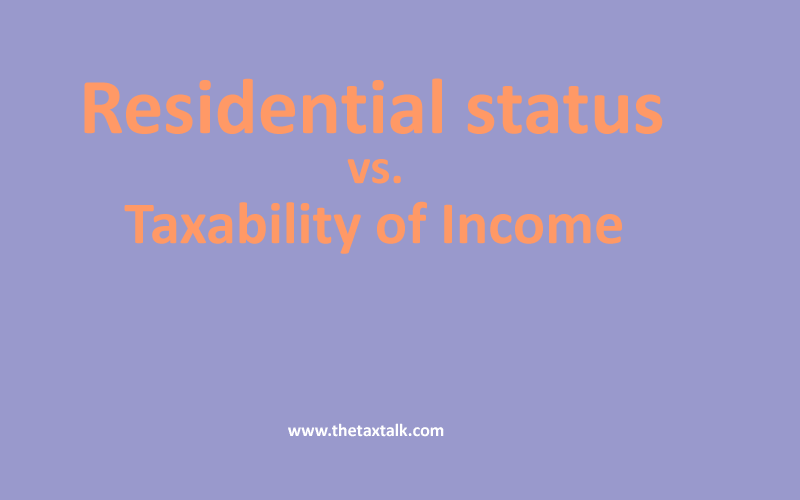![]()
Query 1]
My friend’s son stays in Australia and sends money occasionally to him for maintenance. My friend is a senior citizen retired from pvt. company but is not getting any pension as such. He however gets interest on his fixed deposits kept in national and cooperative banks. But, his income of such interest is around Rs. 2 lakhs a year. This is not taxable as it is much below the exempted limit. To meet his additional requirement his son sometimes sends some money, say 1 lakh or 2 lakhs as a sort of financial help to him.
His wife is house maker and earns nothing.
- Can such occasional income received from his son be treated as ‘Gift’? And if so, up to what limit it is exempted?
- Whether this financial help is to be included in his regular income which he is getting towards interest from his fixed deposits. I shall be thankful for guidance/clarification. [Bhaurao Hedaoo-blhadaoo@hotmail.com]
Opinion:
There are two lasting bequests we can give our children. One is roots. The other is wings–Hodding Carter.
Though thousands of Indians migrates abroad every year for higher education, lucrative jobs, better lifestyle, it’s always pleasure to see the attachment towards their biggest treasure i.e., parent reflected through their regular remittance done. A father’s goodness is higher than the mountain, a mother’s goodness deeper than the sea.
As far as the tax treatment in the present case is concerned,
- The amount remitted by son to the father could either be in the nature of Gift or in the nature of Loan. In either case, the amount would not be treated as income of the parents and would not be subject to income tax. There is no upper ceiling and any quantum of money could be remitted by son to their parents and that too without any tax implications.
- Income generated from the funds would be treated as individual income of the parents and nothing would be subject to the clubbing provision in the hands of son.
Query 2]
One of my relatives has following query. He is a classical vocalist and performs in the concerts in India and earns money. He is staying in Singapore on work visa for last 7-8 years and earn there also. He also pays income tax there in Singapore as per law. He remits some amount out of his savings in Singapore to his NRO bank account in India. How should he file the income tax return as per Indian law for money earned in India? He is an Indian citizen. [P.Nikhilesh- parchuren@outlook.com]
Opinion:
- India follows a ‘source rule’ basis of taxation, i.e. it taxes all incomes which accruing/ arising from an employment or work done in India. Any income accruing or arising to any individual in India is taxable in India. It is irrespective of the residential status of the person. If your relative is a non resident, then none of his income accruing or arising in Singapore would be taxable in India. The ground rule for non-resident Indian is that income which is earned outside India is not taxable in India.
- Confusion often prevails whether the person is a resident or non-resident. The residential status of an individual depends upon the physical stay of the person in India. A person is considered as resident if (a) he is in India in for a period of 182 days or more or (b) he is in India for a period of 60 days or more during the previous year and 365 days or more during 4 years immediately proceeding previous year. [Exception: Condition (b) is not applicable in case of (i) an Indian citizen who leaves India for the purpose of employment outside India or (ii) in case of an Indian citizen or person of Indian origin who comes on a visit to India. In short, in these two cases, an Individual can be treated as resident in India only if he is in India for at least 182 days].
- A resident Indian may either be “Resident and ordinarily resident (ROR)” or “Resident but not ordinarily resident (RNOR)”. An individual qualifying as ROR is taxed on their global income and is required to report their global assets in their income tax return in India. However, an individual qualifying as RNOR is taxed on only India-source income (i.e., income earned in India or received in India).
An individual is considered as RNOR if the following 2 additional conditions are present:
a] He has been resident in India in at least 2 out of 10 preceding year and
b] He has been in India for a period of 730 days or more during the preceding 7 years. - Income Tax Return must be filed by an NRI when their total Indian income (before any deductions) is more than Rs 2,50,000 (for AY 2016-17 or FY 2015-16). Income Tax Return must be compulsorily filed in the following cases:
a] NRI has short term or long term capital gains from any investments or assets (even when gains are less than Rs 2,50,000/-).
b] To get a tax refund
c] To carry forward losses so they can be adjusted later.
A return need not be filed if income from short term or long term capital gains is the only income the NRI has and TDS has been done on it.[Section 115G of the Income Tax Act-1961 & Circular No.372 Dated 8.12.1983 issued by CBDT]
[button color=”” size=”” type=”round” target=”” link=”https://thetaxtalk.com/”]home[/button] [button color=”” size=”” type=”round” target=”” link=”https://thetaxtalk.com/submit-article-publish-your-articles-here/”]Submit Article [/button] [button color=”” size=”” type=”round” target=”” link=”https://thetaxtalk.com/discussion-on-tax-problem/”]Ask Question [/button]

